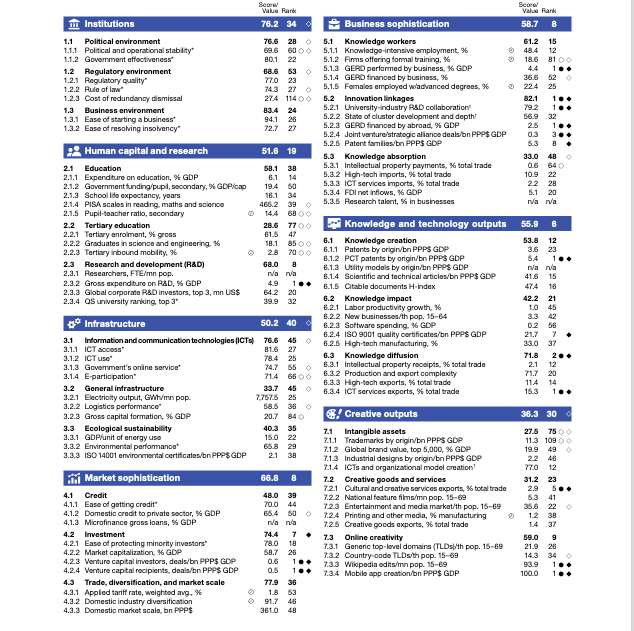Der jährlich erstellte Global Innovation Index* zeigt 2021 für Israel ein komplexes und durchwachsenes Ergebnis. Handlungsbedarf scheint gegeben zu sein. Fakt ist, dass Israel von Platz 13 (2019) auf Platz 14 (2021) auf Platz 15 abrutschte, wie nachstehende Tabelle zeigt:

Gemessen und ausgewertet wurden rund 100 Faktoren, die in sieben großen Gruppen aggregiert sind: Institutionen, Infrastruktur, Humankapital&Forschung, Marktreife, Rahmenbedingungen Wirtschaft&Arbeitskräfte, Output Technik&Wissen und schließlich die Kreativökonomie.
Israel konnte bei den einzelnen Faktoren sehr oft Platz 1 für sich verbuchen. Dies führt im Resultat dazu, dass Israel beim Ranking der Toppositonen – also wieviele Platz 1 Positionen kann Israel halten – auf Platz 3 hinter Hong Kong und den USA liegt.

Wenig überraschend performt Israel in den Bereichen wie beispielsweise Venture Capital (VC) oder Anteil der Forschungsausgaben am Bruttoszialprodukt, die nach wie vor die höchste der Welt ist, überragend und kann sich behaupten. Dennoch reicht es nicht für die Gesamtwertung, in der sich Israel schließlich verschlechterte und an Boden verlor.
Die drei Problembären, die Israels Innovationskraft schwächen, sind die “Institutionen”, die “Infrastruktur” und schließlich das Verhältnis zwischen Lehrer und Schüler in der Sekundarstufe und in der Folge im tertiären Ausbiundgssegment. Um es plakativ zu sagen; es sind zuwenige Lehrer und allgemein wird zu wenig in den Bildungs- und Ausbildungsbereich investiert. Dies sowohl von Firmen als auch vom Staat. Hier besteht in Summe ein dringender Nachholbedarf.
Aber die eigentlichen Mühlsteine sind die “Institutionen” und die “Infrastruktur”. Und wer Israel kennt, der kann dies bestätigen. Beim Feld “Institutionen” reicht es beim globalen Ranking gerade mal für Platz 34 und bei der Infrastruktur liegt Israel gar auf Platz 40. Das erschwert Innovation und lässt Israel in Summe zwei Plätze zum Vorjahr verlieren.
Der Detailbericht listet in seiner Schwächen-Stärke Analyse unter “Schwächen” eben die Bereiche Politik oder Ausbildung auf, aber auch die universitäre Abschlußquote in den Bereichen Wissenschaft&Ingenieurwesen, also die MINT-Fächer, reichen nur für Platz 85 im globalen Ranking. Das ist zuwenig. Sprich, Israel muss massiv in den Ausbildungssektor von der Sekundarstufe aufwärts investieren.
In Summe, Israel kann sich unter extrem schwierigen Bedingungen behaupten, aber die Hauptprobleme für das schlechtere Abschneiden sind hausgemacht. Das ist auch die gute Nachricht, denn das lässt sich lösen.
English Version
The annual Global Innovation Index* shows a complex and mixed result for Israel in 2021. There seems to be a need for action. The fact is that Israel slipped from 13th to 15th place, as the table below shows:

Around 100 factors were measured and evaluated, aggregated into seven major groups: Institutions, infrastructure, human capital&research, market maturity, framework conditions economy&workforce, output technology&knowledge and finally the creative economy.
Israel was very often ranked first in the individual factors. As a result, in the ranking of top positions – i.e. how many first-place positions can Israel hold – Israel is in third place behind Hong Kong and the USA.

Unsurprisingly, Israel outperforms and holds its own in areas such as venture capital (VC) or research spending as a share of gross national product, which remains the highest in the world. Nevertheless, it is not enough for the overall ranking, in which Israel ultimately deteriorates and loses ground.
However, the three problem bears that weaken Israel’s innovative strength are the “institutions”, the “infrastructure” and finally the teacher-student ratio in secondary education and subsequently in the tertiary education segment. To put it bluntly, there are too few teachers and generally too little is invested in education and training. This is true of both companies and the state. There is an urgent need to catch up here in consequence.
But the real millstones are the “institutions” and the “infrastructure”. And anyone who knows Israel can confirm this. In the “institutions” field, Israel is only in 34th place in the global ranking, and in the “infrastructure” field, it is even in 40th place. This makes innovation difficult and causes Israel to lose two places in total compared to the previous year.
In its analysis of weaknesses and strengths, the detailed report lists the areas of politics and education under “Weaknesses”, but the university graduation rate in the areas of science and engineering, i.e. the STEM subjects, is only enough for 85th place in the global ranking. That is not enough. In other words, Israel needs to invest massively in the education sector from secondary education segment upwards.
In sum, Israel can hold its own under extremely difficult conditions, but the main problems for its poorer performance are home-made. That is also the good news, because it can be solved.
* “Der Global Innovation Index (GII) ist eine Rangliste, welche die Innovationsfähigkeit einzelner Länder darstellt. Sie wird in einem jährlichen Intervall von der französischen Business School INSEAD, der Cornell University und der Weltorganisation für geistiges Eigentum (WIPO) der Vereinten Nationen herausgegeben.” (Wikipedia). Der Index wird seit 2007 für rund 130 Volkswirtschaften erstellt. // “The Global Innovation Index (GII) is a ranking of the innovation capacity of individual countries. It is published at annual intervals by the French business school INSEAD, Cornell University and the United Nations World Intellectual Property Organization (WIPO).” (Wikipedia). The index has been compiled for around 130 economies since 2007.